Events
| Name | organizer | Where |
|---|---|---|
| MBCC “Doing Business with Mongolia seminar and Christmas Receptiom” Dec 10. 2025 London UK | MBCCI | London UK Goodman LLC |
NEWS

Intoor Junior tax education program launched www.intooraccount.mn
In connection to the "Year of Tax Education", Intoor Account Audit LLC launched "Intoor Junior Tax Education" a two-year
program in order to improve the public understanding via the special effort to promote the youth background knowledge,
with the support of the General Department of Taxation and the Association of Tax Chartered Public Advisors.
(See one of the serials on the link https://www.youtube.com/watch?v=GSq8CK3zLj8 )
Intoor Account Audit LLC was founded in 2013 and provides professional services on internal audit, accounting, tax consulting and human resource services. Tel: 99106192
...
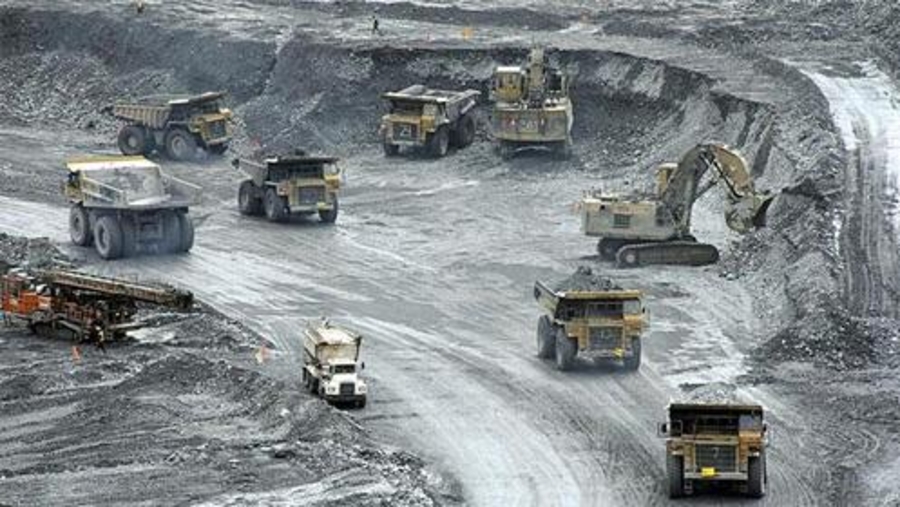
What COP26’s Shift Away From Coal Means for Mongolia www.thediplomat.com
Over the last two weeks, world leaders gathered in Glasgow, Scotland – home of the first industrial revolution – to find a tangible solution to growing climate change issues. The 26th United Nations Global Climate Change Conference (COP26) urged both developed and developing countries to shift from coal-based energy to clean energy by rewiring investments from fossil fuel to environmentally friendly solutions. As a result of this significant pledge, Mongolia and other coal-dependent countries’ long-term economic strategies will be deeply affected.
Mongolia ratified the Paris Agreement in 2016 and has been following the necessary steps by making, reviewing, and updating its Nationally Determined Contribution (NDC) every five years. Mongolia’s national concern for climate change stem from multilayered environmental problems, including air pollution, land degradation, desertification, and mining malpractices that pollute the country’s water resources.
In 2019, Mongolia’s NDC set a target to reduce total greenhouse gas emissions by 14 percent compared to “business-as-usual” levels by 2030, using integrated national and cross-sectoral planning. However, at the Climate Ambition Summit in December 2020, the then-president of Mongolia, Battulga Khaltmaa, stated that Mongolia could achieve a higher NDC target of 27.2 percent reduction in greenhouse gasses if conditional mitigation measures such as carbon capture and storage and waste-to-energy technology were implemented. The Ministry of Energy, Ministry of Transport, and Ministry of Agriculture would all need to be involved in mitigation efforts.
Reducing the usage of coal at a local level is a start. Individual coal usage for cooking and heating homes can be limited at the local level because of its direct environmental effects and toxicity. However, the use of coal for energy grids will most likely continue – not just in Mongolia but in other coal power dependent countries such as Russia, China, Japan, South Korea, Australia, and more. In Mongolia and other countries, securing the financial resources to fully replace the old system of coal-fueled power plants, both at a national and local level, is a major obstacle to fully switching to clean energy by 2030.
Moreover, while coal and air pollution are closely linked, particularly in the Ulaanbaatar area, the coal sector has major economic significance in Mongolia, which gives it precedence over any other issues. The most recent developments during COP26 will challenge Mongolia’s coal sector while opening investment opportunities in clean energy, technology, and green initiatives with its partners worldwide.
During Energy Day, 40 countries, including Canada, the United Kingdom, Poland, Chile, and Vietnam, pledged to shift away from coal and fossil fuel-based investments. Moreover, in a surprise move, in addition to China’s earlier pledge to halt funding for overseas coal plants that are part of Beijing’s Belt and Road Initiative, the United States and China – the world’s two largest greenhouse gas emitters – issued a joint statement pledging to cut fossil fuel usage. The joint declaration stated that “China will phase down coal consumption during the 15th Five Year Plan [which covers the period from 2026 to 2030] and make best efforts to accelerate this work.” According to the International Institute of Green Finance, China has already increased spending on clean energy initiatives.
At a time when Mongolia has been stepping up its supply of coal to China, China’s latest pledges — if followed through — signals a warning sign for Mongolia’s coal sector at large.
Russia, too, has been slowly but surely formulating a climate change policy. The Carnegie Moscow Center reported, “in less than two years Russia has clearly formulated its climate priorities, including the climate emergency in its National Defense Strategy for the first time, implementing indicative planning on achieving the goals set out in its low-carbon strategy, and initiating its first projects for the transition over to green energy.”
The fact that both Russia and China are moving toward clean energy is an indication of both future challenges as well as investment opportunities.
The latest COP26 conference highlighted the vulnerabilities of coal-dependent economies, including Mongolia but also Russia, China, Indonesia, India, and more. As both developed and developing countries are urged to transform their energy sources, there must be a realistic, practical transitional period, methodology, and most importantly, financial resources to make such a switch possible.
For example, Britain, France, Germany, the European Union, and the United States pledged $8.5 billion in grants to South Africa to assist in the transition, while India, Indonesia, and the Philippines have agreed to join South Africa’s Coal Transition Program, a multibillion-dollar pilot program that can assist in the transition to clean energy. Energy analysts say that South Africa’s program is a new model, and the world is watching how South Africa will utilize these funds to determine whether moving from coal to clean energy with foreign funding is a sustainable long-term solution.
While Mongolia is not yet equipped to stop its coal-based power generation entirely, the country is working with European partners to limit CO2 emissions. Sources in the French diplomatic service stated that “France has demonstrated an increasing role in fighting deforestation, forest fires and investing in green energy and agriculture as with EU priorities towards Mongolia.”
To combat climate change, Mongolia has focused on forestry, land use, and establishing a habit of planting trees. Mongolian President Khurelsukh Ukhnaa attended the World Leaders Summit event at the COP26. During the “Action on Forests and Land Use” segment, Khurelsukh stated, “By planting a single tree, it creates the condition for other plants and bushes to grow, absorbing carbon dioxide and retaining soil moisture – contributing to the preventive action has been taken against land degradation and desertification. However, by planting hundreds and thousands of trees, it is possible to return an area to its former state, whereas by planting millions and billions of trees, it is possible to bring back health to an entire region.”
During COP26, “over 130 countries, covering 90% of the world’s forests, have committed to halt and reverse forest loss and land degradation by 2030.” Mongolia is a signatory country to this “Declaration on Forests and Land Use.”
Coinciding with the COP26, Mongolia hosted three climate change-themed forums at a national level. First, the president’s initiative, the “One Billion Tree” campaign, was well-received nationwide and joined by 21 organizations to combat desertification by pledging to plant 600 million trees. Moreover, the National Forestry Forum aimed to expand Mongolia’s forestry programs, and demonstrated the additional funding needs for significant climate change projects involving reforestation, mitigating desertification, and preserving the country’s natural habitat.
The following five to 10 years are crucial for observing where the global climate change trend is heading. While developed countries aim to tackle climate change, it raises an important question on how and whether developing countries can cope with such an acute push. Furthermore, it begs the question of whether developing countries possess the technological, economic, and financial mechanisms to meet such policy goals.
The rewiring of climate finance will force countries like Russia, China, Mongolia, Japan, and South Korea to diversify their energy sources and economic activities. As a significant coal-dependent economy, Mongolia’s strategic and global partners must step up economic cooperation with Mongolia in order to truly assist in diversifying its economy. Mongolia, in turn, can present a better business climate and regulations.
GUEST AUTHOR
Bolor Lkhaajav
Bolor Lkhaajav is a researcher specializing in Mongolia, China, Russia, Japan, East Asia, and the Americas. She holds an M.A. in Asia-Pacific Studies from the University of San Francisco.
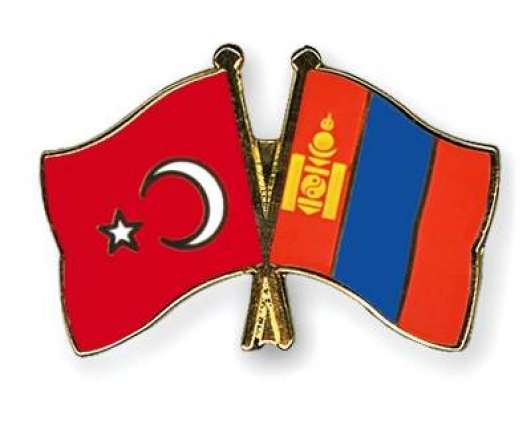
Turkish defense minister talks with Russian, Mongolian counterparts www.aa.com.tr
Turkey's defense minister on Monday spoke separately with his Mongolian and Russian counterparts.
In a phone conversation, Turkey’s Hulusi Akar and Russia’s Sergey Shoygu discussed bilateral and regional defense and security issues, especially the latest situation in Syria, the Turkish Defense Ministry said in a statement.
Separately, Akar also met with Mongolian counterpart Gursed Saikhanbayar in the Turkish capital Ankara.
Akar welcomed Gursed, who is visiting to attend the Turkey-Mongolia Joint Economic Commission Meeting.
After a face-to-face meeting, the two defense chiefs chaired talks between their countries’ delegations.
During the meeting, Akar said that there are strong historical and cultural ties between Turkey and Mongolia.
He also stressed the need for more cooperation in the fields of military education and the defense industry, and the importance of cooperation in the fight against the Fetullah Terrorist Organization (FETO) – the group behind the defeated 2016 coup attempt in Turkey, in which 251 people were killed and 2,734 injured.
Ankara accuses FETO of being behind a long-running campaign to overthrow the state through the infiltration of Turkish institutions, particularly the military, police and judiciary.
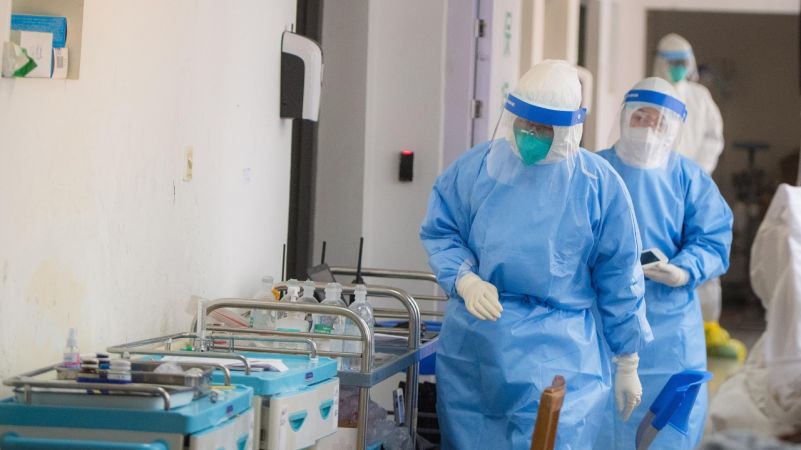
COVID-19: 753 cases, 11 deaths reported www.montsame.mn
November 16, the Ministry of Health reported that 753 СOVID-19 infections and 11 deaths were recorded in the last 24 hours. In detail, 519 cases were reported in Ulaanbaatar city, with 234 cases in 21 provinces.
Today, the cumulative infection tally in Mongolia has increased to 375,285, with the death toll to 1,826. Currently, 9,795 people are receiving hospital treatment for COVID-19 whilst 21,532 people with mild symptoms are being treated at home.
As of November 16, the coverage of 1st dose reached 69.4 percent (2,257,845), 2nd dose – 65.9 percent (2,145,138) and 3rd dose or a booster shot of COVID-19 vaccines – 16.0 percent (513,816) of the total population.
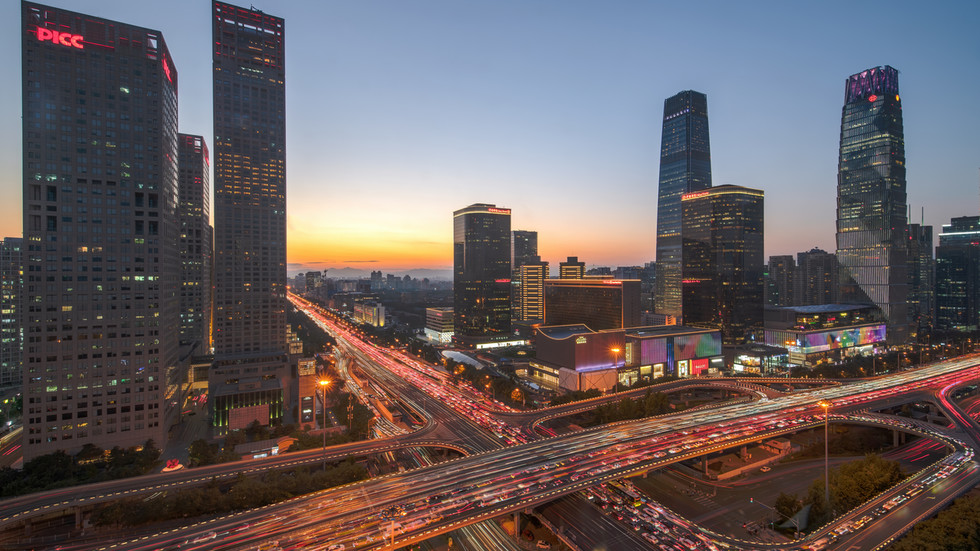
China property: New home prices see biggest fall since 2015 www.bbc.com
China's property slump has deepened official data showed, with new home prices seeing their biggest month-on-month decline since 2015.
New construction starts in January to October also fell 7.7%, compared to a year earlier.
The country's property market has been shaken in recent months as real estate giant Evergrande struggles to keep up interest payments on its huge debts.
China has also been hit by a new wave of Covid cases and major power cuts.
The 0.2% drop in new home prices in October was the biggest fall seen in China since February 2015.
It also marks the first decline in new home prices +since March 2015.
Sentiment in China's property market, which accounts for about a quarter of the country's economic activity by some measures, has been rocked as major property developers grapple with huge debts.
The Evergrande issue
The industry has come under intense scrutiny as fears continue over the future of companies including real estate giant Evergrande.
Last week, Evergrande, which is saddled with around $300bn (£223bn) of debt, avoided defaulting on overdue interest payments of $148m.
Just days before a 30-day grace period on the payments was set to expire it sold a 5.7% stake in media firm HengTen Networks Group for around $145m.
The previous week Evergrande's car making business sold its UK-based electric motor business Protean for an undisclosed sum.
Other Chinese home builders have also struggled to find the money to make debt repayments.
Shares of developer Fantasia plunged by 50% last week after it said there was no guarantee it would be able to meet its other financial obligations following a missed payment of $205.7m in October.
And earlier this month, trading in shares of Kaisa Group and three of its units was halted in Hong Kong after one of its businesses missed a payment on a wealth management product.
Global impact
The debt crisis faced by Chinese property giants had triggered concerns amongst some international investors that it could have a major impact on global financial markets.
However, in recent weeks a number of high-profile figures have moved to help calm those fears.
On Monday, the governor of the Bank of Japan Haruhiko Kuroda said that he believed that China's property woes were unlikely to trigger a global shock as the amount of money owed to creditors outside the country was relatively low.
"We don't expect China's property woes to have a big impact on Japan's economy or financial institutions. We also don't see a huge risk of the woes triggering a big, global shock," Mr Kuroda told business leaders in the city of Nagoya, central Japan.
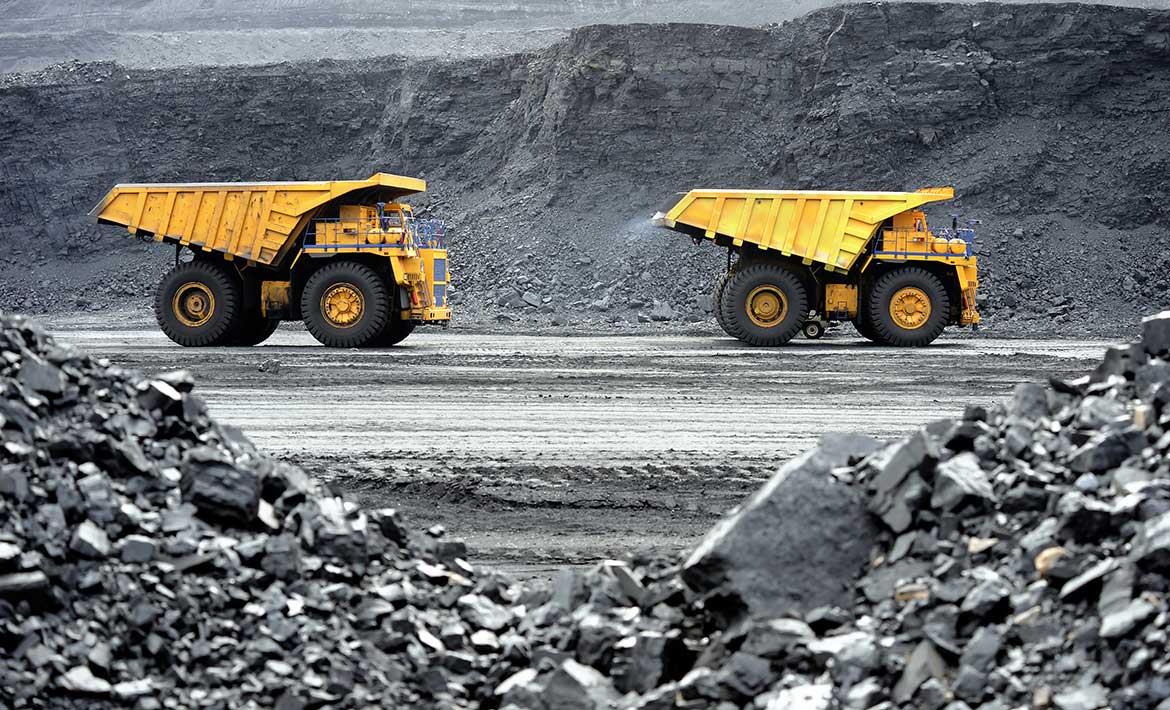
Mongolia plans to clear its 8.94 million coking coal stocks before end-February 2022 www.news.mn
The number of coking coal trucks from Mongolia to China has also risen, improving the supply outlook, Guangzhou-based investment consultancy Founder CIFCO Futures said. In October, the number of trucks hauling coal from Mongolia into China averaged 400 a day, double from September volumes.
Mongolia has emerged as one of the key coal suppliers to China in the absence of Australian coal, with almost no coal trade seen between the two countries since the end of 2020.
Mongolia’s government is also planning to clear its 8.94 million coking coal stocks before end-February 2022, and forecast Mongolian coal trucks to China to rise further in the near term.
The pandemic has disrupted Mongolian coal traffic to China in 2021, with recurring cases delaying customs clearances. China imported 10.5789 million coking coal from Mongolia in January-September, down 64% on the year, China’s customs data showed.
Last year, coal trade flows from Mongolia to China reached a historical high after about 2,200 trucks hauled coal daily in August 2020, Platts reported earlier.

Mongolia to train consultants on tree planting to combat climate change www.xinhuanet.com
Nov. 15 (Xinhua) -- Mongolia will train at least 1,000 consultants on tree planting to combat climate change and desertification, President Ukhnaa Khurelsukh said Monday.
Khurelsukh, who has recently initiated a national tree-planting campaign called "Billion Trees" aimed at planting a billion trees by 2030, made the remarks during a national conference on forestry.
"The skilled human resource in any sector is a key driver of the sector's development. Therefore, at least 1,000 trainers to give advice on planting trees will be trained within the framework of the national tree-planting campaign in the near future," said Khurelsukh.
Citizens, companies and governmental and non-governmental organizations across the country have joined the national campaign.
Up to 21 major mining companies in Mongolia have recently signed a deal to plant a total of 608.5 million trees by 2030, and authorities of the country's capital Ulan Bator and all 21 provinces have pledged to plant 680 million trees in the coming nine years, said the presidential press office.
The Asian country has a total land area of 1,564,116 square km but only 7.9 percent is covered by forests. Around 77 percent of the country's total territory has been affected by desertification and land degradation, according to the country's Ministry of Environment and Tourism.

Mongolia confirms 491 new daily cases of coronavirus, 10 deaths www.akipress.com
Mongolia confirmed 491 new daily cases of coronavirus infection as of Nov 15, the Ministry of Health said, the total number increased to 374 532.
352 new daily cases were confirmed in Ulaanbaatar, and 139 cases were detected in the regions.
4,231 hospitalized patients are in mild condition, 4,446 in serious, 1,180 in critical and 226 in extremely critical condition.
10 people died per day raising the death toll to 1,815.
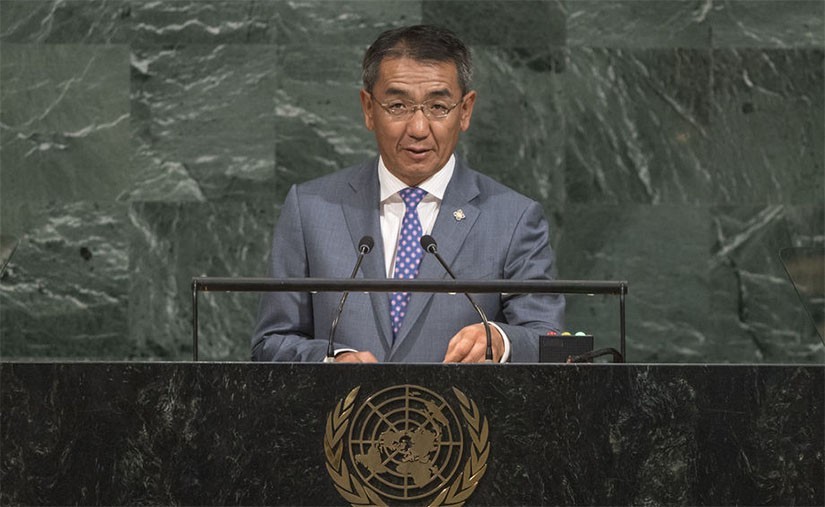
MP Ts.Munkh-Orgil elected as member of UN International Law Commission www.montsame.mn
Member of Parliament Ts.Munkh-Orgil has been elected as a member of the International Law Commission (ILC) for the term 2023-2027. For the first time, Mongolia had nominated its candidate for the election of the ILC members, which took place at the 32nd plenary meeting of the 76th session of the UN General Assembly in New York on November 12.
As one of 34 members, MP Ts.Munkh-Orgil will enjoy the status of experts on mission for five-year term beginning on 1 January 2023.
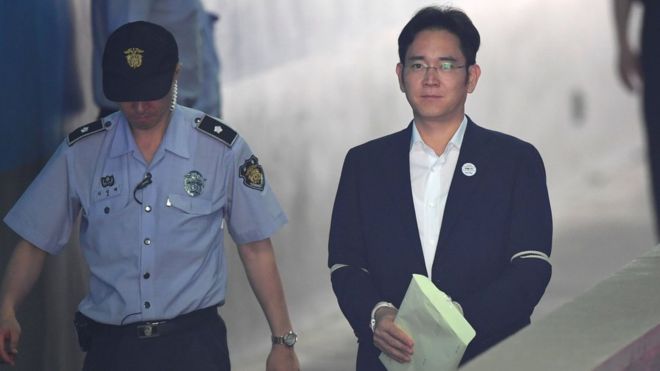
Samsung's Lee visits U.S ahead of likely $17 bln chip plant decision-media www.reuters.com
SEOUL, Nov 15 (Reuters) - Samsung Electronics (005930.KS) vice chairman Jay Y. Lee is visiting North America in his first high-profile trip after serving jail time for bribery, with a decision imminent on the company's planned $17 billion U.S. chip plant.
Lee left Seoul on Sunday and his trip to Canada and the United States is expected to coincide with a decision on the location of the new plant, Yonhap and other local media said. read more
A site in Texas' Williamson County, near the city of Taylor, offered the better incentives package among various sites Samsung has been considering for the new chip plant that is set to make advanced logic chips, sources previously told Reuters.
Since Samsung vice chairman Kim Kinam confirmed the chip plant plan in May, Samsung has been comparing incentives and working out who pays what in convoluted land and other agreements, while also considering the available amount of stable utilities such as water and electricity, one of the sources with knowledge of the matter said.
The source declined to be identified as they were not authorised to speak to media.
A winter storm in the first quarter hit Samsung's chip plant in Austin, Texas, laying bare the importance of stable utilities, as a shutdown caused by blackouts affected wafers corresponding to around 300-400 billion won ($254-339 million) of damages.
"I am set to meet many U.S. partners," Lee told reporters before his flight on Sunday, without elaborating.
He said he also expected to visit Boston, where COVID-19 vaccine maker Moderna's (MRNA.O) headquarters are located.
Last month, South Korea granted emergency use approval for Moderna's vaccine produced by drugmaker Samsung BioLogics (207940.KS), which has a "fill and finish" deal with Moderna.
Lee was convicted in January of bribery and embezzlement and sentenced to 30 months in jail - including a year served before his sentencing. Upon his parole in August, the presidential office said it expected Lee will help the country procure "semiconductors and vaccines".
($1 = 1,179.6200 won)
Reporting by Joyce Lee; editing by Richard Pullin and Kim Coghill
- «
- 1
- 2
- 3
- 4
- 5
- 6
- 7
- 8
- 9
- 10
- 11
- 12
- 13
- 14
- 15
- 16
- 17
- 18
- 19
- 20
- 21
- 22
- 23
- 24
- 25
- 26
- 27
- 28
- 29
- 30
- 31
- 32
- 33
- 34
- 35
- 36
- 37
- 38
- 39
- 40
- 41
- 42
- 43
- 44
- 45
- 46
- 47
- 48
- 49
- 50
- 51
- 52
- 53
- 54
- 55
- 56
- 57
- 58
- 59
- 60
- 61
- 62
- 63
- 64
- 65
- 66
- 67
- 68
- 69
- 70
- 71
- 72
- 73
- 74
- 75
- 76
- 77
- 78
- 79
- 80
- 81
- 82
- 83
- 84
- 85
- 86
- 87
- 88
- 89
- 90
- 91
- 92
- 93
- 94
- 95
- 96
- 97
- 98
- 99
- 100
- 101
- 102
- 103
- 104
- 105
- 106
- 107
- 108
- 109
- 110
- 111
- 112
- 113
- 114
- 115
- 116
- 117
- 118
- 119
- 120
- 121
- 122
- 123
- 124
- 125
- 126
- 127
- 128
- 129
- 130
- 131
- 132
- 133
- 134
- 135
- 136
- 137
- 138
- 139
- 140
- 141
- 142
- 143
- 144
- 145
- 146
- 147
- 148
- 149
- 150
- 151
- 152
- 153
- 154
- 155
- 156
- 157
- 158
- 159
- 160
- 161
- 162
- 163
- 164
- 165
- 166
- 167
- 168
- 169
- 170
- 171
- 172
- 173
- 174
- 175
- 176
- 177
- 178
- 179
- 180
- 181
- 182
- 183
- 184
- 185
- 186
- 187
- 188
- 189
- 190
- 191
- 192
- 193
- 194
- 195
- 196
- 197
- 198
- 199
- 200
- 201
- 202
- 203
- 204
- 205
- 206
- 207
- 208
- 209
- 210
- 211
- 212
- 213
- 214
- 215
- 216
- 217
- 218
- 219
- 220
- 221
- 222
- 223
- 224
- 225
- 226
- 227
- 228
- 229
- 230
- 231
- 232
- 233
- 234
- 235
- 236
- 237
- 238
- 239
- 240
- 241
- 242
- 243
- 244
- 245
- 246
- 247
- 248
- 249
- 250
- 251
- 252
- 253
- 254
- 255
- 256
- 257
- 258
- 259
- 260
- 261
- 262
- 263
- 264
- 265
- 266
- 267
- 268
- 269
- 270
- 271
- 272
- 273
- 274
- 275
- 276
- 277
- 278
- 279
- 280
- 281
- 282
- 283
- 284
- 285
- 286
- 287
- 288
- 289
- 290
- 291
- 292
- 293
- 294
- 295
- 296
- 297
- 298
- 299
- 300
- 301
- 302
- 303
- 304
- 305
- 306
- 307
- 308
- 309
- 310
- 311
- 312
- 313
- 314
- 315
- 316
- 317
- 318
- 319
- 320
- 321
- 322
- 323
- 324
- 325
- 326
- 327
- 328
- 329
- 330
- 331
- 332
- 333
- 334
- 335
- 336
- 337
- 338
- 339
- 340
- 341
- 342
- 343
- 344
- 345
- 346
- 347
- 348
- 349
- 350
- 351
- 352
- 353
- 354
- 355
- 356
- 357
- 358
- 359
- 360
- 361
- 362
- 363
- 364
- 365
- 366
- 367
- 368
- 369
- 370
- 371
- 372
- 373
- 374
- 375
- 376
- 377
- 378
- 379
- 380
- 381
- 382
- 383
- 384
- 385
- 386
- 387
- 388
- 389
- 390
- 391
- 392
- 393
- 394
- 395
- 396
- 397
- 398
- 399
- 400
- 401
- 402
- 403
- 404
- 405
- 406
- 407
- 408
- 409
- 410
- 411
- 412
- 413
- 414
- 415
- 416
- 417
- 418
- 419
- 420
- 421
- 422
- 423
- 424
- 425
- 426
- 427
- 428
- 429
- 430
- 431
- 432
- 433
- 434
- 435
- 436
- 437
- 438
- 439
- 440
- 441
- 442
- 443
- 444
- 445
- 446
- 447
- 448
- 449
- 450
- 451
- 452
- 453
- 454
- 455
- 456
- 457
- 458
- 459
- 460
- 461
- 462
- 463
- 464
- 465
- 466
- 467
- 468
- 469
- 470
- 471
- 472
- 473
- 474
- 475
- 476
- 477
- 478
- 479
- 480
- 481
- 482
- 483
- 484
- 485
- 486
- 487
- 488
- 489
- 490
- 491
- 492
- 493
- 494
- 495
- 496
- 497
- 498
- 499
- 500
- 501
- 502
- 503
- 504
- 505
- 506
- 507
- 508
- 509
- 510
- 511
- 512
- 513
- 514
- 515
- 516
- 517
- 518
- 519
- 520
- 521
- 522
- 523
- 524
- 525
- 526
- 527
- 528
- 529
- 530
- 531
- 532
- 533
- 534
- 535
- 536
- 537
- 538
- 539
- 540
- 541
- 542
- 543
- 544
- 545
- 546
- 547
- 548
- 549
- 550
- 551
- 552
- 553
- 554
- 555
- 556
- 557
- 558
- 559
- 560
- 561
- 562
- 563
- 564
- 565
- 566
- 567
- 568
- 569
- 570
- 571
- 572
- 573
- 574
- 575
- 576
- 577
- 578
- 579
- 580
- 581
- 582
- 583
- 584
- 585
- 586
- 587
- 588
- 589
- 590
- 591
- 592
- 593
- 594
- 595
- 596
- 597
- 598
- 599
- 600
- 601
- 602
- 603
- 604
- 605
- 606
- 607
- 608
- 609
- 610
- 611
- 612
- 613
- 614
- 615
- 616
- 617
- 618
- 619
- 620
- 621
- 622
- 623
- 624
- 625
- 626
- 627
- 628
- 629
- 630
- 631
- 632
- 633
- 634
- 635
- 636
- 637
- 638
- 639
- 640
- 641
- 642
- 643
- 644
- 645
- 646
- 647
- 648
- 649
- 650
- 651
- 652
- 653
- 654
- 655
- 656
- 657
- 658
- 659
- 660
- 661
- 662
- 663
- 664
- 665
- 666
- 667
- 668
- 669
- 670
- 671
- 672
- 673
- 674
- 675
- 676
- 677
- 678
- 679
- 680
- 681
- 682
- 683
- 684
- 685
- 686
- 687
- 688
- 689
- 690
- 691
- 692
- 693
- 694
- 695
- 696
- 697
- 698
- 699
- 700
- 701
- 702
- 703
- 704
- 705
- 706
- 707
- 708
- 709
- 710
- 711
- 712
- 713
- 714
- 715
- 716
- 717
- 718
- 719
- 720
- 721
- 722
- 723
- 724
- 725
- 726
- 727
- 728
- 729
- 730
- 731
- 732
- 733
- 734
- 735
- 736
- 737
- 738
- 739
- 740
- 741
- 742
- 743
- 744
- 745
- 746
- 747
- 748
- 749
- 750
- 751
- 752
- 753
- 754
- 755
- 756
- 757
- 758
- 759
- 760
- 761
- 762
- 763
- 764
- 765
- 766
- 767
- 768
- 769
- 770
- 771
- 772
- 773
- 774
- 775
- 776
- 777
- 778
- 779
- 780
- 781
- 782
- 783
- 784
- 785
- 786
- 787
- 788
- 789
- 790
- 791
- 792
- 793
- 794
- 795
- 796
- 797
- 798
- 799
- 800
- 801
- 802
- 803
- 804
- 805
- 806
- 807
- 808
- 809
- 810
- 811
- 812
- 813
- 814
- 815
- 816
- 817
- 818
- 819
- 820
- 821
- 822
- 823
- 824
- 825
- 826
- 827
- 828
- 829
- 830
- 831
- 832
- 833
- 834
- 835
- 836
- 837
- 838
- 839
- 840
- 841
- 842
- 843
- 844
- 845
- 846
- 847
- 848
- 849
- 850
- 851
- 852
- 853
- 854
- 855
- 856
- 857
- 858
- 859
- 860
- 861
- 862
- 863
- 864
- 865
- 866
- 867
- 868
- 869
- 870
- 871
- 872
- 873
- 874
- 875
- 876
- 877
- 878
- 879
- 880
- 881
- 882
- 883
- 884
- 885
- 886
- 887
- 888
- 889
- 890
- 891
- 892
- 893
- 894
- 895
- 896
- 897
- 898
- 899
- 900
- 901
- 902
- 903
- 904
- 905
- 906
- 907
- 908
- 909
- 910
- 911
- 912
- 913
- 914
- 915
- 916
- 917
- 918
- 919
- 920
- 921
- 922
- 923
- 924
- 925
- 926
- 927
- 928
- 929
- 930
- 931
- 932
- 933
- 934
- 935
- 936
- 937
- 938
- 939
- 940
- 941
- 942
- 943
- 944
- 945
- 946
- 947
- 948
- 949
- 950
- 951
- 952
- 953
- 954
- 955
- 956
- 957
- 958
- 959
- 960
- 961
- 962
- 963
- 964
- 965
- 966
- 967
- 968
- 969
- 970
- 971
- 972
- 973
- 974
- 975
- 976
- 977
- 978
- 979
- 980
- 981
- 982
- 983
- 984
- 985
- 986
- 987
- 988
- 989
- 990
- 991
- 992
- 993
- 994
- 995
- 996
- 997
- 998
- 999
- 1000
- 1001
- 1002
- 1003
- 1004
- 1005
- 1006
- 1007
- 1008
- 1009
- 1010
- 1011
- 1012
- 1013
- 1014
- 1015
- 1016
- 1017
- 1018
- 1019
- 1020
- 1021
- 1022
- 1023
- 1024
- 1025
- 1026
- 1027
- 1028
- 1029
- 1030
- 1031
- 1032
- 1033
- 1034
- 1035
- 1036
- 1037
- 1038
- 1039
- 1040
- 1041
- 1042
- 1043
- 1044
- 1045
- 1046
- 1047
- 1048
- 1049
- 1050
- 1051
- 1052
- 1053
- 1054
- 1055
- 1056
- 1057
- 1058
- 1059
- 1060
- 1061
- 1062
- 1063
- 1064
- 1065
- 1066
- 1067
- 1068
- 1069
- 1070
- 1071
- 1072
- 1073
- 1074
- 1075
- 1076
- 1077
- 1078
- 1079
- 1080
- 1081
- 1082
- 1083
- 1084
- 1085
- 1086
- 1087
- 1088
- 1089
- 1090
- 1091
- 1092
- 1093
- 1094
- 1095
- 1096
- 1097
- 1098
- 1099
- 1100
- 1101
- 1102
- 1103
- 1104
- 1105
- 1106
- 1107
- 1108
- 1109
- 1110
- 1111
- 1112
- 1113
- 1114
- 1115
- 1116
- 1117
- 1118
- 1119
- 1120
- 1121
- 1122
- 1123
- 1124
- 1125
- 1126
- 1127
- 1128
- 1129
- 1130
- 1131
- 1132
- 1133
- 1134
- 1135
- 1136
- 1137
- 1138
- 1139
- 1140
- 1141
- 1142
- 1143
- 1144
- 1145
- 1146
- 1147
- 1148
- 1149
- 1150
- 1151
- 1152
- 1153
- 1154
- 1155
- 1156
- 1157
- 1158
- 1159
- 1160
- 1161
- 1162
- 1163
- 1164
- 1165
- 1166
- 1167
- 1168
- 1169
- 1170
- 1171
- 1172
- 1173
- 1174
- 1175
- 1176
- 1177
- 1178
- 1179
- 1180
- 1181
- 1182
- 1183
- 1184
- 1185
- 1186
- 1187
- 1188
- 1189
- 1190
- 1191
- 1192
- 1193
- 1194
- 1195
- 1196
- 1197
- 1198
- 1199
- 1200
- 1201
- 1202
- 1203
- 1204
- 1205
- 1206
- 1207
- 1208
- 1209
- 1210
- 1211
- 1212
- 1213
- 1214
- 1215
- 1216
- 1217
- 1218
- 1219
- 1220
- 1221
- 1222
- 1223
- 1224
- 1225
- 1226
- 1227
- 1228
- 1229
- 1230
- 1231
- 1232
- 1233
- 1234
- 1235
- 1236
- 1237
- 1238
- 1239
- 1240
- 1241
- 1242
- 1243
- 1244
- 1245
- 1246
- 1247
- 1248
- 1249
- 1250
- 1251
- 1252
- 1253
- 1254
- 1255
- 1256
- 1257
- 1258
- 1259
- 1260
- 1261
- 1262
- 1263
- 1264
- 1265
- 1266
- 1267
- 1268
- 1269
- 1270
- 1271
- 1272
- 1273
- 1274
- 1275
- 1276
- 1277
- 1278
- 1279
- 1280
- 1281
- 1282
- 1283
- 1284
- 1285
- 1286
- 1287
- 1288
- 1289
- 1290
- 1291
- 1292
- 1293
- 1294
- 1295
- 1296
- 1297
- 1298
- 1299
- 1300
- 1301
- 1302
- 1303
- 1304
- 1305
- 1306
- 1307
- 1308
- 1309
- 1310
- 1311
- 1312
- 1313
- 1314
- 1315
- 1316
- 1317
- 1318
- 1319
- 1320
- 1321
- 1322
- 1323
- 1324
- 1325
- 1326
- 1327
- 1328
- 1329
- 1330
- 1331
- 1332
- 1333
- 1334
- 1335
- 1336
- 1337
- 1338
- 1339
- 1340
- 1341
- 1342
- 1343
- 1344
- 1345
- 1346
- 1347
- 1348
- 1349
- 1350
- 1351
- 1352
- 1353
- 1354
- 1355
- 1356
- 1357
- 1358
- 1359
- 1360
- 1361
- 1362
- 1363
- 1364
- 1365
- 1366
- 1367
- 1368
- 1369
- 1370
- 1371
- 1372
- 1373
- 1374
- 1375
- 1376
- 1377
- 1378
- 1379
- 1380
- 1381
- 1382
- 1383
- 1384
- 1385
- 1386
- 1387
- 1388
- 1389
- 1390
- 1391
- 1392
- 1393
- 1394
- 1395
- 1396
- 1397
- 1398
- 1399
- 1400
- 1401
- 1402
- 1403
- 1404
- 1405
- 1406
- 1407
- 1408
- 1409
- 1410
- 1411
- 1412
- 1413
- 1414
- 1415
- 1416
- 1417
- 1418
- 1419
- 1420
- 1421
- 1422
- 1423
- 1424
- 1425
- 1426
- 1427
- 1428
- 1429
- 1430
- 1431
- 1432
- 1433
- 1434
- 1435
- 1436
- 1437
- 1438
- 1439
- 1440
- 1441
- 1442
- 1443
- 1444
- 1445
- 1446
- 1447
- 1448
- 1449
- 1450
- 1451
- 1452
- 1453
- 1454
- 1455
- 1456
- 1457
- 1458
- 1459
- 1460
- 1461
- 1462
- 1463
- 1464
- 1465
- 1466
- 1467
- 1468
- 1469
- 1470
- 1471
- 1472
- 1473
- 1474
- 1475
- 1476
- 1477
- 1478
- 1479
- 1480
- 1481
- 1482
- 1483
- 1484
- 1485
- 1486
- 1487
- 1488
- 1489
- 1490
- 1491
- 1492
- 1493
- 1494
- 1495
- 1496
- 1497
- 1498
- 1499
- 1500
- 1501
- 1502
- 1503
- 1504
- 1505
- 1506
- 1507
- 1508
- 1509
- 1510
- 1511
- 1512
- 1513
- 1514
- 1515
- 1516
- 1517
- 1518
- 1519
- 1520
- 1521
- 1522
- 1523
- 1524
- 1525
- 1526
- 1527
- 1528
- 1529
- 1530
- 1531
- 1532
- 1533
- 1534
- 1535
- 1536
- 1537
- 1538
- 1539
- 1540
- 1541
- 1542
- 1543
- 1544
- 1545
- 1546
- 1547
- 1548
- 1549
- 1550
- 1551
- 1552
- 1553
- 1554
- 1555
- 1556
- 1557
- 1558
- 1559
- 1560
- 1561
- 1562
- 1563
- 1564
- 1565
- 1566
- 1567
- 1568
- 1569
- 1570
- 1571
- 1572
- 1573
- 1574
- 1575
- 1576
- 1577
- 1578
- 1579
- 1580
- 1581
- 1582
- 1583
- 1584
- 1585
- 1586
- 1587
- 1588
- 1589
- 1590
- 1591
- 1592
- 1593
- 1594
- 1595
- 1596
- 1597
- 1598
- 1599
- 1600
- 1601
- 1602
- 1603
- 1604
- 1605
- 1606
- 1607
- 1608
- 1609
- 1610
- 1611
- 1612
- 1613
- 1614
- 1615
- 1616
- 1617
- 1618
- 1619
- 1620
- 1621
- 1622
- 1623
- 1624
- 1625
- 1626
- 1627
- 1628
- 1629
- 1630
- 1631
- 1632
- 1633
- 1634
- 1635
- 1636
- 1637
- 1638
- 1639
- 1640
- 1641
- 1642
- 1643
- 1644
- 1645
- 1646
- 1647
- 1648
- 1649
- 1650
- 1651
- 1652
- 1653
- 1654
- 1655
- 1656
- 1657
- 1658
- 1659
- 1660
- 1661
- 1662
- 1663
- 1664
- 1665
- 1666
- 1667
- 1668
- 1669
- 1670
- 1671
- 1672
- 1673
- 1674
- 1675
- 1676
- 1677
- 1678
- 1679
- 1680
- 1681
- 1682
- 1683
- 1684
- 1685
- 1686
- 1687
- 1688
- 1689
- 1690
- 1691
- 1692
- 1693
- 1694
- 1695
- 1696
- 1697
- 1698
- 1699
- 1700
- 1701
- 1702
- 1703
- 1704
- 1705
- 1706
- 1707
- 1708
- 1709
- 1710
- 1711
- 1712
- 1713
- 1714
- »






